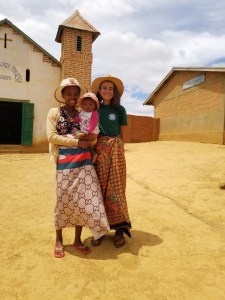
Christmas is less than two weeks away, but you’d be hard-pressed to find the usual signs of it here in Madagascar.
There are no twinkling lights lining the rooftops, nor blow-up snowmen waving to passersby from snowy yards. No festive wreaths on doors, nor decorated pine trees standing tall in the town center. And, as far as I can tell, no Christmas music to be heard.
In Madagascar, where 85% of people are Christian, Christmas is largely a religious holiday. There are no expectations of gifts, for children or otherwise. Stories about Santa, his elves and his flying reindeers have not yet percolated into the culture of rural Madagascar. Rather, the vast majority of people will observe Christmas by heading to church to pray and celebrate the birth of Jesus Christ.
The one place I did see decorations last year was inside of the Catholic church that I attend every so often. Garlands were strung in the rafters, and a nativity scene featuring Mary, Joseph and baby Jesus was constructed to the right of the altar.
Broadly speaking, holidays here feel much different than those in the U.S. For one, there’s simply fewer of them.
The major holidays here in Madagascar are Independence Day, New Year’s, Christmas, Easter, and International Women’s day on March 8. We don’t celebrate Thanksgiving or Halloween.
Holidays here are also far less commercialized, likely in part because people don’t have much disposable income.

For an American like me who’s used to measuring the passage of time by the seasonal decorations around town, holiday TV specials and chronically premature displays in department stores, holidays here in Madagascar honestly feel a bit plain to me. But that’s not to say I haven’t found aspects to enjoy.
I’m not one to get especially sentimental during the holidays. Still, it’s odd to know Christmas is coming and not see the familiar signs. For the second year in a row, I won’t be checking the weather reports in hope of snow, nor preparing to attend Christmas Eve at my wonderful Aunt Rita’s house.
Last year, I went to church with a neighbor on Christmas and spent more than three hours sitting on a packed bench praying for the service to come to an end. I was hot, hungry and thirsty when it finally did. I ate lunch with my host family after returning home, then passed out on a raffia mat for much of the afternoon.
It certainly wasn’t my favorite Christmas, that’s for sure. So this year, I’m planning to head to my first host family’s home in Mantasoa near the capital and celebrate with them.
We’re going to chop down a pine tree and decorate it with a mixture of homemade and purchased decorations. I’m also planning to buy a (live) turkey and make a nice, traditional American Christmas dinner (but with rice, of course). I’m sure we’ll play some holiday tunes, too.
I’m really looking forward to it. I have a sneaking suspicion it’ll be more enjoyable than last year’s Christmas.
And then, I’ll return home to celebrate New Year’s Day in my village.

Everyone in Madagascar celebrates New Year’s; it’s the second biggest holiday of the year after Independence Day. Families begin saving money months in advance in order to purchase meat for dinner.
Celebrations here are quite similar to ours in the U.S.: Many people party all night with snacks and alcohol, and count down the final seconds as the new year approaches.
And then on New Year’s Day, hundreds, if not thousands, of people come to my village from the surrounding area to drink and party.
Music blasts from speakers powered by generators, and dozens of people lay out plastic tarps to sell fried breads, peanuts, crackers, alcohol and other snacks.
This year will be my first time experiencing New Year’s in my village. Last year, all of the volunteers in my region were consolidated in Fianarantsoa on New Year’s Eve due to an approaching storm, and so I missed the festivities.
My host family and I are planning to eat turkey on New Year’s, and we’ll probably prepare some mashed potatoes, vegetables, a salad, and rice, of course, to go with it. Without an oven, we’ll have to boil the turkey to prepare it, the same as we do for chicken. We’re all really looking forward to it.
Only, I’ve hit a small snag. We bought the turkey we plan to eat a couple of weeks ago, expecting prices to shoot up near New Year’s. But the next day, I made a snap decision to buy a small female turkey at a good price, and they’ve been getting cute and cuddly ever since.
I’m not sure I have it in me to separate this adorable couple. So I may have to buy another turkey for us to eat instead.
Such is life here in Madagascar.
Once New Year’s is finished, we won’t celebrate another holiday until International Women’s Day on March 8. Oddly enough, this is a huge holiday in my area.

Local women’s groups start preparing for the holiday months in advance, and many women order custom T-shirts and matching lambas, the fabric that women wrap around their waist to form a skirt.
The festivities start with speeches and performances in the morning, followed by a giant party that stretches into the night. The next day, the women’s groups do organized activities, like planting trees and cleaning up local government offices.
Easter follows soon after International Women’s Day, and the observance is largely religious, much like Christmas.
But so far, it’s my favorite holiday of all here in Madagascar. Earlier this year, I traveled to my first host family’s home to celebrate Easter along with another volunteer, Cyrus, who lived with them before me.

We celebrated the holiday by helping our host mom, Gaële, serve food at her pop-up restaurant during the Easter festival in Mantasoa. The day was long and chaotic, but I had a blast; I like to think the Malagasy folks had a good laugh at being served by a couple of foreigners, too.
Last, but certainly not least, is Madagascar’s Independence Day on June 26. On this day, Malagasy people celebrate their liberation from France in 1960. Much like our celebration on July 4, Malagasy people celebrate June 26 with performances, food, dancing and drinks; some display Malagasy flags, the only holiday-related decoration I’ve seen outside people’s homes here.
For unknown reasons, I agreed to do a public skit on Independence Day with my Malagasy tutor, in which I pretended to be a Malagasy person introducing my foreigner visitor. While I’m sure I flubbed many of my lines as I ironically sought to correct my tutor’s intentionally poor Malagasy, the people watching seemed to have a good laugh.
Holiday celebrations look somewhat different in the cities, where people have more money to spend and there’s more cultural influence from foreign countries.
Both Fianarantsoa and Ambalavao have carnivals every year on Independence Day, with small human-powered Ferris wheels for children to ride and firework displays at night. If you look really hard, you can almost see the Ambalavao fireworks from my village.
Christmas lights are strung in some wealthier neighborhoods in the capital, and imported Christmas decorations can be bought for a hefty price in grocery stores frequented by foreigners.
I may not be overly sentimental about the holidays, but if there’s one thing I’m looking forward to about returning home, it’s celebrating Thanksgiving and Christmas once again with family and friends in familiar surroundings.
That, and cheese platters.

A reader asked:
What’s the weather in Madagascar like now? — Anonymous in Farmington
Madagascar’s weather is more or less opposite of that in Maine because we’re south of the equator. I like to imagine folks in Maine sitting cozy by the fire; me, on the other hand, I sit in my house for much of the afternoon hiding from the burning heat. Thankfully, we’re almost past the hottest part of the year, and the rains are slowly starting up again. The best part? All different kinds of fruits are coming into season now, including my favorites: lycee, pineapple and, soon, avocados.
Have a question? Send it to [email protected] or by snail mail to the Sun Journal at 64 Lisbon St., Suite 201, Lewiston, ME 04240.

On a personal note:
Madagascar may not have Thanksgiving, but I was lucky enough to celebrate the holiday with a group of volunteers and Fulbrighters last month in Antsirabe, a city south of the capital and on my way home. There, we enjoyed a beautiful charcuterie board of meats, nuts, crackers, fruits and cheese; it was the first time I ate sharp cheddar since arriving here more than a year ago. The power was out, so we had to cook everything on a gas stovetop, including the turkey. I made macaroni and cheese, and our head chef, Sarah, cooked mashed potatoes, stuffing and green beans, too. It was absolutely wonderful. You should have seen me marveling at our friend Nielsen’s modern kitchen and bathroom while we were there; Madagascar has truly made me more appreciative of the little things in life.
Vanessa Paolella is a Peace Corps volunteer in Madagascar, a former award-winning staff writer for the Sun Journal and a Bates College graduate. The views expressed in this column are hers alone and do not reflect the views of the U.S. government, the Peace Corps, or the Madagascar government.
We invite you to add your comments. We encourage a thoughtful exchange of ideas and information on this website. By joining the conversation, you are agreeing to our commenting policy and terms of use. More information is found on our FAQs. You can modify your screen name here.
Comments are managed by our staff during regular business hours Monday through Friday as well as limited hours on Saturday and Sunday. Comments held for moderation outside of those hours may take longer to approve.
Join the Conversation
Please sign into your Sun Journal account to participate in conversations below. If you do not have an account, you can register or subscribe. Questions? Please see our FAQs.